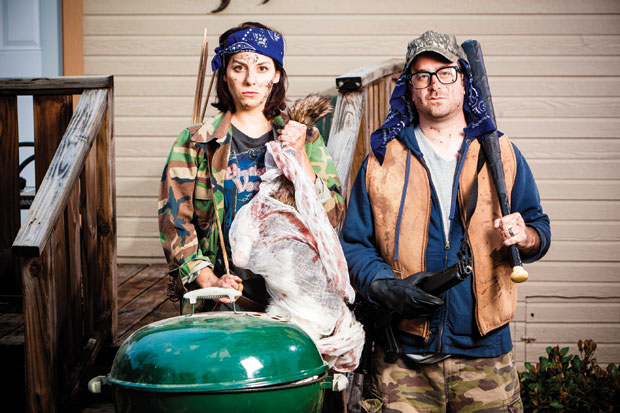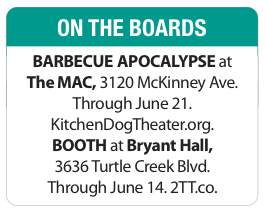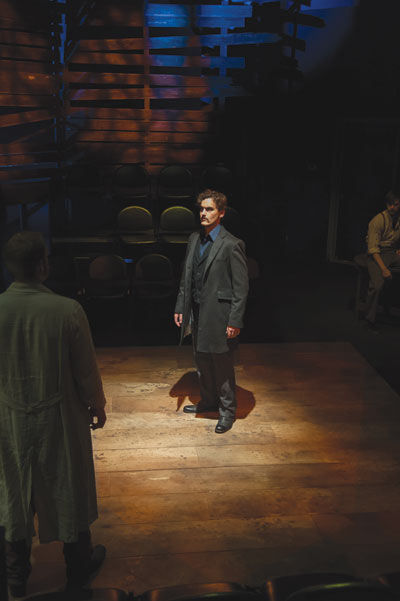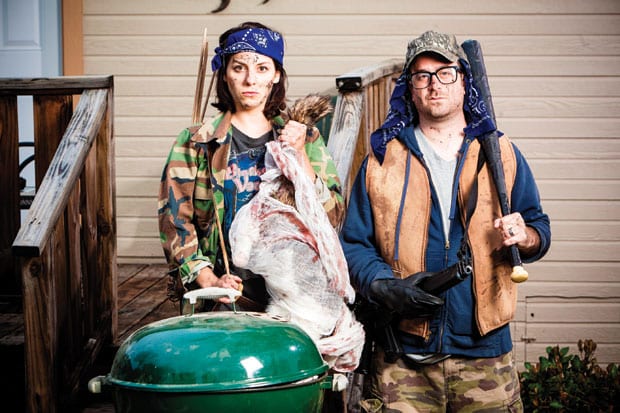‘BBQ’ roasts modern society; ‘Booth’ explores the making of an assassin

END OF THE WORLD | Deb (Martha Harms) and Mike (Michael Federico) prove their mettle in ‘Barbecue Apocalypse,’ above; Montgomery Sutton is eerily accurate as a fanatic in ‘Booth,’ opposite.
ARNOLD WAYNE JONES | Life+Style Editor
 Some people are just inherently, effortlessly funny. They have porous minds, where ideas seem to escape in a slow leak — you’re never sure where a drip will lead, or if it will pool into a primordial ooze where laughter can germinate, spreading like a new life form that becomes self-sustaining.
Some people are just inherently, effortlessly funny. They have porous minds, where ideas seem to escape in a slow leak — you’re never sure where a drip will lead, or if it will pool into a primordial ooze where laughter can germinate, spreading like a new life form that becomes self-sustaining.
Matt Lyle is one of those people.
I doubt Lyle can not be funny, because he doesn’t try to be in the first place. It seems to come naturally to him, as you can tell even during the prerecorded curtain speech that kicks off Barbecue Apocalypse, his world premiere dark comedy now at Kitchen Dog Theater. Lyle personally recorded the “turn your phones off” screed, but rather than tune it out, you laugh. A lot. And the play hasn’t even started. And that’s just a taste for what’s to come.
The premise is simple, even predictable. Childless couple Deb and Mike (Martha Harms and Michael Federico), apparently DUPPIES (downwardly mobile urban professionals), feel like they will never grow up. Their lawn isn’t mowed, they still decorate their house with old movie posters and beanbag chairs, they can’t throw a decent dinner party, so they call it a cook-out … and yet they still crave to impress the neighbors. Deb doesn’t understand why Mike is even still friends with college buddy Win (Max Hartman), an arrogant, misogynistic bully who brags about his money and that his young new girlfriend Glory (Miranda Parham) is auditioning for the Rockettes (even though he’s never seen a Rockettes show and seems to have only a vague knowledge of what they do). Then there’s Ash (Jeff Swearingen) and Lulu (Leah Spillman), self-consciously douchy hipsters who tsk-tsk that the beef isn’t organic and the wifi isn’t 4G. Who would want to be like any of these people?!
Deb and Mike, that’s who. And you and me, admit it.
Barbecue Apocalypse is a droll indictment of our consumer society, where worth is weighed not by happiness (Deb and Mike might be happy if they could only let themselves not care what others’ think) but by acquisitions. Ash seems surgically attached at the eyeball to his Twitter feed, ignoring his sexually frustrated wife, who, it turns out, is not pregnant, just paunchy. How could she be pregnant when Ash can’t pause web-surfing long enough to get it up?
As the title suggests, things don’t stay that way for long. At the end of Act 1, some kind of worldwide cataclysm occurs (it doesn’t matter what), and earth is plunged into a Walking Dead/The Road dystopia of ravaging looters, cannibals, privation. And you can forget streaming your favorite shows on HuluPlus. There are new skills to value in this society, and expressing yourself in 140 characters ain’t one of them.
Lyle structures the play cannily, with Act 2 symmetrical to Act 1: Another backyard barbecue, with the same guests, same chit-chat and a vastly different dynamic. “Where’s Glory?” everyone asks Win in turn, gently following up with a cluckish, “You didn’t eat her, did you?” Character is destiny. (He didn’t eat her. He did something far worse.)
The vast reservoir of pop culture Lyle mines to create dialogue that is both realistic and stylized reveals a kind of Aspergery love of language that’s hard to over-praise. The play isn’t laden with jokes so much as a way of saying things with hilarious understatement. You may want to see it twice just to hear all the lines you missed the first time.
The cast is ideal, and director Lee Trull maintains a deadpan style that allows Lyle’s genius to shine through. I could see this on a New York stage running for years. Like, say, Portlandia, it has a voice that speaks to the modern era and the modern ear. The decline and fall of civilization has never been so amusing … or so accurate.
Booth, playing inside Bryant Hall on the Kalita Humphreys campus, is, technically, a play: It takes place on a stage with live actors and an intermission between acts. In every other particular, Booth is a movie: Full of jump-cuts, multiple time lines, lots of dialogue and populated with a score of characters. It’s an exhausting historical drama, the kind even Hollywood seems loath to take on much these days.
Set in the aftermath of, and lead-up to, the Lincoln assassination, it centers on the actor and Confederate patriot John Wilkes Booth (an eerie doppelganger in Montgomery Sutton), who, with a klatch of disgruntled sore losers, plots the kidnapping of the president, the vice president and the secretary of state … then improvises, and instead shoots just one of them in the back of the head. His impulsiveness proves to be a boondoggle, committing his cohorts to a murder they never wanted, martyring Lincoln and unintentionally facilitating the reunification of the United States. History has labeled him a villain and a traitor, surely a resident of Dante’s seventh circle.
 History, perhaps, but not Steven Walters, who wrote and directed Booth. He seems less convinced that Booth was all bad, or that the government’s pursuit of him (and especially his fellow conspirators) was all good. Was Lincoln a bully, suspending habeas corpus and such, only deified because he was felled before the bad decisions could cement? And did the behavior of Secretary of War Mars Stanton (Stan Denman) — falsifying evidence in order to coerce confessions, violating constitutional rights to get what he wanted … and all without benefit of the USA PATRIOT Act. (Walters and costume designer Jennifer Ables pepper the dialogue and the clothes with modern iterations, possibly to suggest parallels to then and now, but unlike, say, a totally modern-dress version of Shakespeare, it often comes across as merely careless.)
History, perhaps, but not Steven Walters, who wrote and directed Booth. He seems less convinced that Booth was all bad, or that the government’s pursuit of him (and especially his fellow conspirators) was all good. Was Lincoln a bully, suspending habeas corpus and such, only deified because he was felled before the bad decisions could cement? And did the behavior of Secretary of War Mars Stanton (Stan Denman) — falsifying evidence in order to coerce confessions, violating constitutional rights to get what he wanted … and all without benefit of the USA PATRIOT Act. (Walters and costume designer Jennifer Ables pepper the dialogue and the clothes with modern iterations, possibly to suggest parallels to then and now, but unlike, say, a totally modern-dress version of Shakespeare, it often comes across as merely careless.)
Booth is a play of ideas, but many of them are subsumed in Walters’ gangly technique — a style common to many modern plays, where intensity and voluble language stand in the stead of character development. The cool start and end, with the singing of classic era-appropriate songs, doesn’t prepare us for the pandemonium to come. As a result, it reinforced some of the actors’ less-likeable gimmicks and sometimes ventures into the unintentionally comic. (In order to cue in the audience when Booth is post-assassination, Sutton will suddenly clasp his broken leg and wince in pain; after a while, it comes to resemble Fred Sanford’s “I’m coming Elizabeth!” cardiac grab.)
Still, there’s no denying the thought and intelligence that went into creating this world premiere. Walters draws a straight line between Booth’s performance in Julius Caesar and his fanatic’s commitment to the conspiracy … and the line continues all the way past JFK and up to Edward Snowden and the NSA.
Many actors in the large cast stand out, which is sometimes hard to do since they all sport variations of muttonchops, sideburns and other variations of whisker. (I haven’t seen so many beards in one place since a reunion of Tom Cruise’s exes.) In addition to Sutton, Brandon Sterrett’s icy evil as Payne, and Frank Moseley’s performance both as Booth’s more talented brother Edwin and as a befuddled immigrant lured into the conspiracy, were distinctive and memorable. I can imagine them both in the film version … then again, that’s kind of what this production already is.
This article appeared in the Dallas Voice print edition May 30, 2014.

